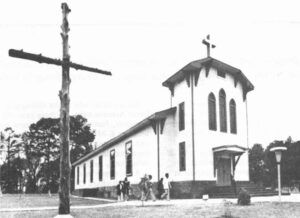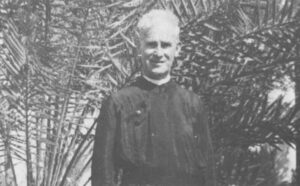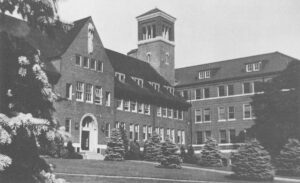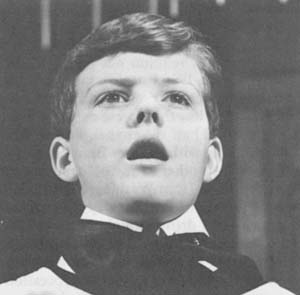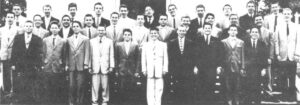WASHINGTON, D.C.–Lying in his bed in the family farmhouse those first five or six months after he left, a man I’ll call Jerry used to think about how he would commit suicide, if it came to that. He would put a shotgun in his mouth and pull the trigger with a string looped to his toe. He laughed then, for he had remembered something: “I was so out of it when I first went there I used to sneak out to the toilets to put on my deodorant. I didn’t want anybody to see my underarms.” He is an atheist now, he said, and then corrected himself and said he was probably an agnostic: he can’t prove God doesn’t exist. Now and then, he said, he still gets in his black depressions. On the evening I sat with him, he was finishing law school at an ivy league university. He was editor of the law review and was then being courted by the best firms on Wall Street. “The whole Catholic thing is so far away,” he said with a kind of dreaminess when I pressed for something else. After he went to the kitchen I asked his wife if he talked about the seminary much, and she said not much but that when he did he always got animated.
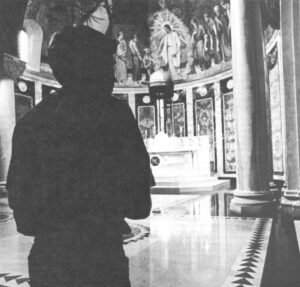 More than a year ago, I began this fellowship with an idea I couldn’t prove. The idea was this: out there, in Moline and Fort Worth and Kansas City, were ex-seminarians and former priests and current priests and atheists and agnostics and true believers whom I hadn’t seen in years, decades in some cases, but whom I was nonetheless tied to, and they to me, by mysterious fibres, nodes of existence, chains of interlocking grace and paradox and melancholy and reverie that run from a center I was determined to find. Now, these months later, I can say, with some sense of grinning contradiction, that there has been nothing to dissuade me from my idea of an invisible network, a spiritual grid among us, but that I am no closer to finding its center than I was when I started out. I think I knew this is how it was going to be.
More than a year ago, I began this fellowship with an idea I couldn’t prove. The idea was this: out there, in Moline and Fort Worth and Kansas City, were ex-seminarians and former priests and current priests and atheists and agnostics and true believers whom I hadn’t seen in years, decades in some cases, but whom I was nonetheless tied to, and they to me, by mysterious fibres, nodes of existence, chains of interlocking grace and paradox and melancholy and reverie that run from a center I was determined to find. Now, these months later, I can say, with some sense of grinning contradiction, that there has been nothing to dissuade me from my idea of an invisible network, a spiritual grid among us, but that I am no closer to finding its center than I was when I started out. I think I knew this is how it was going to be.
The first time I called up Jim Dermody, which was several years ago, before I began this project, but was thinking about it, I recall him saying almost tonelessly and without detectable self-pity, “I have no past.” It was as if it was a cold hard fact. Dermody, who was two years behind me in the seminary and has an almost mystic Celtic capacity to enjoy seedy taverns and grey weather (I have been with him in both these last few years), is a high school English composition teacher at Gordon Tech in Chicago. He is in Chicago because Chicago is where he left the order; he could just as well be in Seattle, he said. He left in the late Sixties, when the walls seemed to be caving in, and not from Vietnam or assassinations, though that was some of it, he guesses. “I didn’t want to be the last one out,” he said. He also said he wonders sometimes if he didn’t make a mistake. On noon hours now he’ll slip into his school’s chapel and just sit there.
In the past year I have been out to California and down to Puerto Rico and no farther than a ten minute subway ride from my own house, and what I’ve found, in most instances, is a piece of a musty dream, each piece fitting into a huge puzzling puzzle. The dream has many shades but its primary color was ever this: getting chrismed with oils by a bishop and going out to labor amid migrants and sharecroppers and rural blacks and inner-city Hispanics, seeking to restore to the faith those who had drifted away. That was the motto of the order I studied for: ad fidem servandam. For saving the faith. We were all going to be servers.
Something Happened
Except that something got in the way, or more correctly, I guess, a number of things got in the way, including some personal selfishness and a failure to keep one’s eye on the ball. But for many of us the Second Vatican Council, which turned the Church upside down, also got in the way, changed the rules, and so did a spiritual restiveness and the wider crashing world of the Sixties themselves, though I think in this specific instance it must be said that the eventual disarray also had to do with a move of the seminary from Alabama to central Virginia, with the transition from ramshackle wood to new brick. I don’t mean that purely on the level of symbol. My order had begun to change over the years, had gotten computers and millionaire donors, had gone increasingly urban and mainstream in the Church, had seemed to move away from, as perhaps was inevitable, its primitive spirit of poverty. The order was changing as the Church was changing as the world was changing as we were changing. Nobody planned it, particularly; few saw it. And what happened, I think, is the waters got too roiled, at least for a time. A certain missionary fire was lost. The center didn’t hold, as it wasn’t holding in other seminaries, as it wasn’t holding on college campuses for different reasons. In a way we were only one wave behind. Suddenly the way of life seemed obsolete, anachronistic, a yawning dinosaur. By the close of the decade my seminary was effectively dead, victim of dwindling enrollment. In 1973 it locked its doors. I was long gone by then, separated from my wife, soon to file for divorce in a Michigan court, out of touch and time with old schoolmates and priestly feelings, on edge, living for the space of stories I got in newspapers, killing off everything around me that breathed of church and religion. I write these words this morning, a thirty- six-year- old not particularly gloomy ambivalent believer who has twice married, the second time out of his Church. I have quit more cities and jobs than probably I should have. I don’t go to church regularly. I have wriggled through a number of other changes. And yet, wherever I go, almost whatever I do, I find the seminary comes softly clacking along behind, like a child’s duck dragged on a string.
Sometimes, after I’ve had a fight with my wife, I think I know what the seminary really gave me: an ability to put people down, cut them, as we used to call it. The refectory, where we banged down our food, was survival of the fastest and in a different way so were the rec rooms. I remember participating in “cut” sessions after dinner when the floor would seem awash with someone’s blood. And then there are other times when I am sure that what seven years in the seminary gave me was a leg up on life, because the seminary allowed me to glimpse something from the inside. Perhaps I am thinking now of evening benediction, when a priest would lift a glittering spiked monstrance from the altar, wrap it in the satin cape that was draped around his shoulders and was bunched in his hands, turn and pass it before our eyes while tallow dripped and incense floated and the stillness seemed deafening. The monstrance, encasing the pale wafer, would spangle like sunwhite gold, and it was at such moments I was sure, and just no longer suspected, I was at the epicenter of something.
Staying Loose
Those same feelings are out there, I believe, in my network. The grid extends down to Ecuador, where somebody is a rug baron and has three factories; to Meadville, Pennsylvania, where somebody is a clinical psychologist; to New York, where somebody is on an FBI SWAT Team; to San Diego, where somebody manages a Seven-Eleven; to upstate New York, where somebody runs an off-track betting parlor; to Washington, D.C., where I live, and where somebody else whom I didn’t know back then-he was more than a decade ahead of me-is now Ronald Reagan’s Secretary of Labor. I don’t think Ray Donovan was formed by the same things we were, and yet I’ll bet the chords of correspondency are there. I haven’t talked to him yet but I intend to.
I’ve spent some time this past year with my old role models, the priests who taught us. Some of them don’t wear religious garb anymore and aren’t called father except by their kids. Jack Kenny is a probation officer, ministering to a 49-year-old man who beat up his wife with a broom handle (“His wife is full of God, full of hope, but she knows down deep things won’t change.”), to a 14-year-old who slashed an old lady with a scissors. When I knew Jack Kenny his name was Father Claude, only we didn’t call him that much. We called him Cadge. Cadge was a corruption of Cash, which had nothing to do with money but everything to do with attitude, with being casual. After he left the seminary faculty Father Claude volunteered for a South American expedition. He went down and fell in love with a Canadian nun. “Maybe it is a dream too soon for its time,” the Cadge wrote in a letter to the Holy Father, petitioning to marry Phyllis and yet remain a priest who worked amid the poor in the barrios of Quito, Ecuador. “I am not a hero. I wonder, though, if our mutual love and hopes might be a sign of the times.” The pope never wrote back. Later, planning to marry Phyllis outside his Church, he had written his only brother, trying to explain: “Love, life, God and time are sometimes mitigating factors. Stay loose. I am.”
Nowadays my old college prefect, Father Ambrose, who was a whiz with electronics, is a service rep on hospital X-ray equipment. His name is Bob Benzig and his lunch is out of a sack. He is married to a shy, intelligent black woman and lives with her in an inner city neighborhood in Toledo that once was white and is now becoming black. “It’s an old neighborhood,” he said on the phone, and then repeated that, when I asked if I could come by. When I saw him he was 58, still reed thin and jerky in his movement, though his hair was now past his ears. His daughter, Elizabeth Jane, had been born two months previous. “We’re losing our buttons,” he said merrily, sticking her over his head, making faces at her, the old raucous, half-asthmatic laugh perfectly intact. Father Ambrose didn’t leave the priesthood because his Church wouldn’t change. He left because he was in love, which came after a tour in Africa, in Botswana, in the Peace Corps. Afterward he came home and met Marian in Chicago. And now he repairs X-ray equipment in Toledo and takes out the garbage at midnight. Processo, the Spanish might call it. On the night I stayed with him, he talked of money worries, of the nightmare vision of ending up in his sixties on welfare, stuck off in a room somewhere with no work and growing kids. “We have to believe in a provident God who’s been provident so far,” he said. He said nearly his whole life it had been a mystery to him how people got up and went to work every day. He talked of a powerlessness, of being “the recipient of other people’s decisions, the people who get on jets and travel around on these big images of themselves.” As he said it he drew in the air a large, round, weary, invisible loop. That night he made dinner- hamburgers, fruit salad, sweet potatoes-and ate at least half of it while his two-year-old, Caroline Maria, nodded on his lap. “These memories are alive in us, we live with them,” he said.
©1981 Paul Hendrickson
Paul Hendrickson concludes his fellowship study, Searching for a Seminary: 1955-1981, with this issue.

